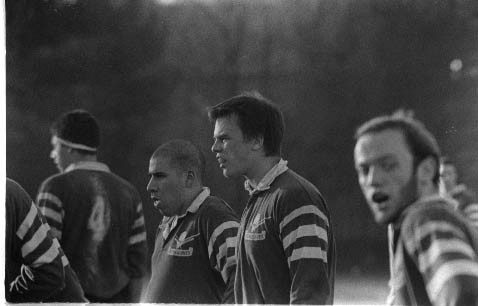
Teamwork is a difficult exercise, because things never quite work as planned. Obviously if you have a “traditional” job you just have to follow your job description, and just say no when something reaches you that is not written there: but when you are in a small team that needs to cover a lot of ground, when you are in the middle of a project and everything changes while still having to be delivered, doing that will just make you an asshole.
In rugby, you have roles for everyone: the fast ones, the strong ones, the heavy ones, the agile ones. You may accumulate more than one characteristic. Surely, you must embrace your differences because it’s those differences combined together that make the team win.
So you are all different, each member of the team has to understand and manage those differences. You may be strong, but the guy on the left may not be like you, if you pass the ball you have to think about what he can do with it in the current context: never nice to send someone crashing into a wall.
Anybody can mark: it’s about the opportunity, not the size, weight or function. What is logical on a terrain might actually be difficult to translate on the job side: anybody should know that they can bring something valuable and ultimately make the team win.
Communicate: passing a ball may sound as a unidirectional thing, but it works well only if the two are conscious there is a transmission, which is very different from one sending a ball to nowhere and another catching it. So there should be signals and information on both side, to do it at the right time and in the right context.
Rehearse, plan the unplanned: what should happen if? Rehearsing is also a way to learn about your team members: ask them to give counter arguments and challenge you to make better projects. You can play at 100% during those rehearsal, but don’t forget to slow down a bit with newcomers!
Be careful of big matches without rehearsing: there’s a chance that this shows you as great individuals if it works, but show that you’re a bad team if you loose.
Try stupid things : the other team expects things from you, surprise them. Good surprise is often well planned surprise, so rehearse it.
Look at the other team: who has your number on the other side ? How does he interact with the other guys? Learn from watching. Look also at the way they are organised, and collect feedback from people on the outside that may have a bigger picture. Your clients are (or should be) your fans!
Spend some time after the match to review what went well and what didn’t. It can be a party, as rugby teach us too: it’s a lighter way to tell when some stuff went wrong.
Party with the other teams too: there’s no better way to know them, and to know everything about the craft and stories. That draws a good picture of your team. And when you move place, you might actually be happy to go in another team you know.
Be your sport advocate: get good people from the outside world to join. You need diversity.
I once put together an amazing team where everybody found his own role, based on his tastes and capacities, in a constantly moving environment: we just knew what we had to do, “bring the ball to the other side”. Then we were asked to plan for things and wait for orders: most left because it wasn’t a game anymore. So let’s find a new game that works for the new guys!
Cedric
Originally published on Linkedin, September 2017
Photo from Catherine Basinski, Valenciennes University Rugby Team, Feb 2000